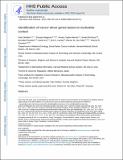Identification of cancer driver genes based on nucleotide context
Author(s)
Dietlein, Felix; Weghorn, Donate; Taylor-Weiner, Amaro; Richters, André; Reardon, Brendan; Liu, David; Lander, Eric S.; Van Allen, Eliezer M.; Sunyaev, Shamil R.; ... Show more Show less
DownloadAccepted version (8.609Mb)
Open Access Policy
Open Access Policy
Creative Commons Attribution-Noncommercial-Share Alike
Terms of use
Metadata
Show full item recordAbstract
© 2020, The Author(s), under exclusive licence to Springer Nature America, Inc. Cancer genomes contain large numbers of somatic mutations but few of these mutations drive tumor development. Current approaches either identify driver genes on the basis of mutational recurrence or approximate the functional consequences of nonsynonymous mutations by using bioinformatic scores. Passenger mutations are enriched in characteristic nucleotide contexts, whereas driver mutations occur in functional positions, which are not necessarily surrounded by a particular nucleotide context. We observed that mutations in contexts that deviate from the characteristic contexts around passenger mutations provide a signal in favor of driver genes. We therefore developed a method that combines this feature with the signals traditionally used for driver-gene identification. We applied our method to whole-exome sequencing data from 11,873 tumor–normal pairs and identified 460 driver genes that clustered into 21 cancer-related pathways. Our study provides a resource of driver genes across 28 tumor types with additional driver genes identified according to mutations in unusual nucleotide contexts.
Date issued
2020-02Department
Koch Institute for Integrative Cancer Research at MITJournal
Nature Genetics
Publisher
Springer Science and Business Media LLC
ISSN
1061-4036
1546-1718